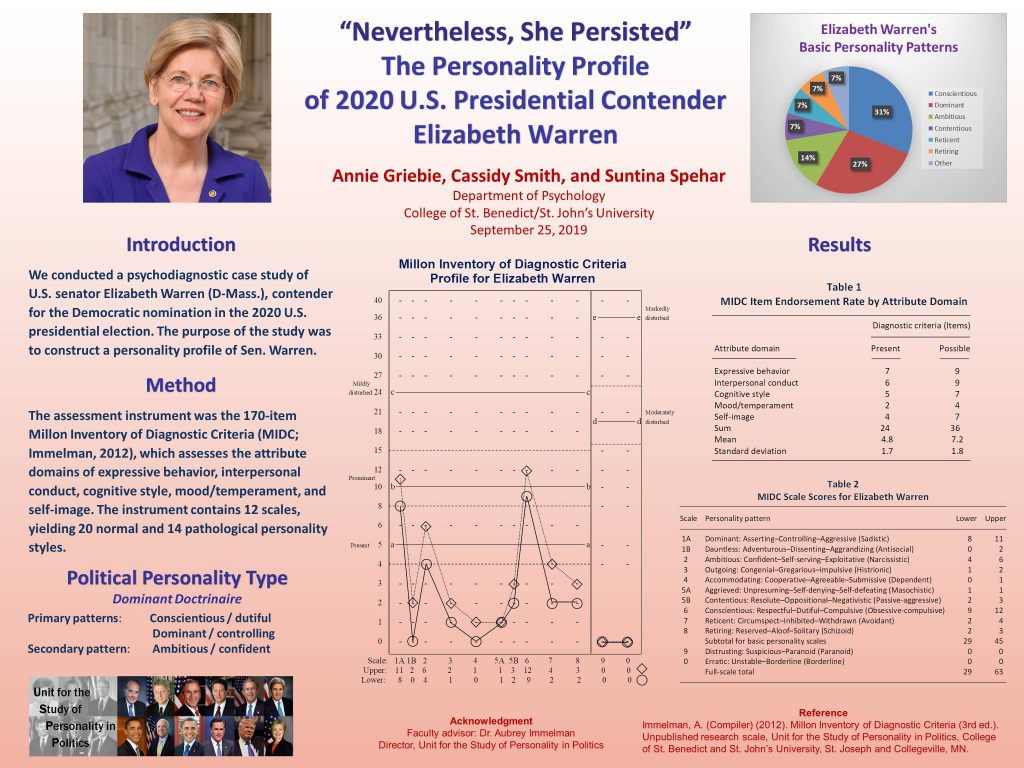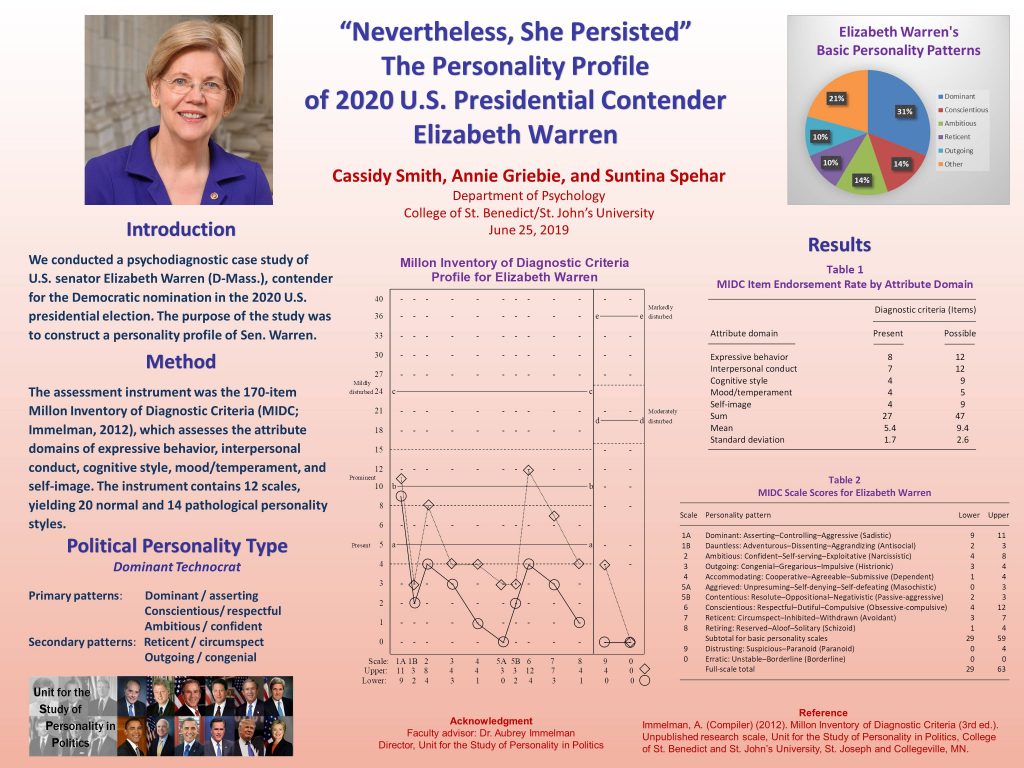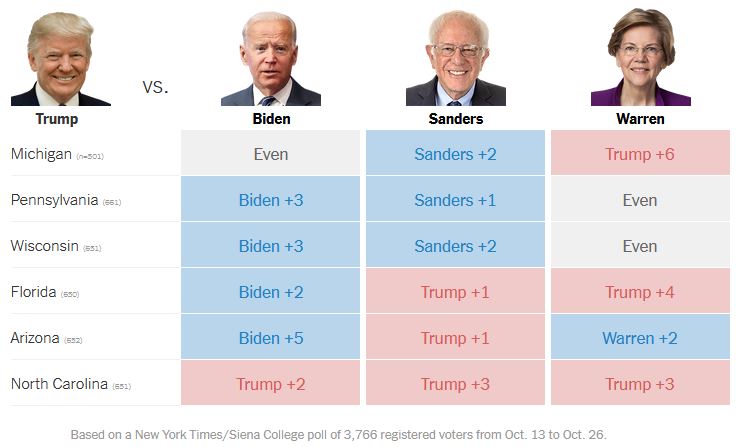The Personality Profile of U.S. Senator Elizabeth Warren
September 25, 2019
A psychological analysis of U.S. Senator Elizabeth Warren by Annie Griebie, Cassidy Smith, Suntina Spehar, and Aubrey Immelman, Ph.D., at the Unit for the Study of Personality in Politics, revealed that Sen. Warren’s primary personality patterns are Conscientious/dutiful and Dominant/controlling, complemented by secondary Ambitious/confident features. The study also yielded equivocal indicators of minor Reticent/circumspect, Retiring/reserved, and Contentious/resolute tendencies. In summary, Warren may be characterized as a dominant doctrinaire political personality type.
Presidential Electability Index range: 6-8
The Personality Profile of U.S. Senator Elizabeth Warren
 Click on image for larger view
Click on image for larger view
Abstract
The poster presents the results of an indirect assessment of the personality of U.S. Senator Elizabeth Warren — a contender for the Democratic nomination in the 2020 presidential election — from the conceptual perspective of personologist Theodore Millon. Information concerning Warren was collected from biographical sources and media reports and synthesized into a personality profile using the Millon Inventory of Diagnostic Criteria (MIDC), which yields 34 normal and maladaptive personality classifications congruent with DSM-III-R, DSM-IV, and DSM-5.
The personality profile yielded by the MIDC was analyzed on the basis of interpretive guidelines provided in the MIDC and Millon Index of Personality Styles manuals. Warren’s primary personality patterns were found to be Conscientious/dutiful and Dominant/controlling, complemented by secondary Ambitious/confident features. The study also yielded equivocal indicators of minor Reticent/circumspect, Retiring/reserved, and Contentious/resolute tendencies.
In political-psychological terms, Warren may be characterized as a dominant doctrinaire – highly assertive, strong-willed, outspoken, detail-oriented, organized, and ideological, buttressed by confidence in her policy positions and motivated for public service both by a sense of duty and personal ambition.
Preliminary Personality Profile of U.S. Senator Elizabeth Warren
June 25, 2019
A preliminary psychological analysis of U.S. Senator Elizabeth Warren by Cassidy Smith, Annie Griebie, Suntina Spehar, and Aubrey Immelman, Ph.D., at the Unit for the Study of Personality in Politics, revealed that Sen. Warren’s primary personality patterns are Dominant/asserting, Conscientious/respectful, and Ambitious/confident, complemented by secondary Reticent/circumspect and Outgoing/congenial features. In summary, Warren may be characterized as a dominant technocrat political personality type.
Presidential Electability Index range: 11-15
The Personality Profile of U.S. Senator Elizabeth Warren

Click on image for larger view
Abstract
The poster presents the preliminary results of an indirect assessment of the personality of U.S. Senator Elizabeth Warren — a contender for the Democratic nomination in the 2020 presidential election — from the conceptual perspective of personologist Theodore Millon. Information concerning Warren was collected from biographical sources and media reports and synthesized into a personality profile using the Millon Inventory of Diagnostic Criteria (MIDC), which yields 34 normal and maladaptive personality classifications congruent with DSM-III-R, DSM-IV, and DSM-5.
The personality profile yielded by the MIDC was analyzed on the basis of interpretive guidelines provided in the MIDC and Millon Index of Personality Styles manuals. Warren’s primary personality patterns were found to be Dominant/asserting, Conscientious/respectful, and Ambitious/confident, complemented by secondary Reticent/circumspect and Outgoing/congenial features.
In political-psychological terms, Warren may be characterized as a dominant technocrat – assertive, strong-willed, and outspoken, buttressed by confidence in her policy positions and motivated for public service both by personal ambition and a sense of duty.
Related interest: Formal announcement of candidacy
Elizabeth Warren announces Iowa trip as she starts running for president in 2020 (Astead W. Herndon and Alexander Burns, New York Times, Dec. 31, 2018) — Senator Elizabeth Warren, the Massachusetts Democrat and a sharp critic of big banks and unregulated capitalism, entered the 2020 race for president on Monday, becoming the first major candidate in what is likely to be a long and crowded primary marked by ideological and generational divisions in a Democratic Party determined to beat President Trump. …
U.S. Sen. Elizabeth Warren officially announces 2020 presidential bid
Sen. Elizabeth Warren takes the stage at about 51:00
Sen. Elizabeth Warren announced for president on December 31, 2018, suspended her campaign on March 5, 2020, and endorsed Joe Biden for president on April 15, 2020.
Notable media reports
Many Democrats love Elizabeth Warren. They also worry about her. (Jonathan Martin, New York Times, Aug. 15, 2019) — Even as she demonstrates why she is a leading candidate for the party’s nomination, Ms. Warren is facing persistent questions and doubts about whether she would be able to defeat President Trump in the general election. The concerns, including from her admirers, reflect the head-versus-heart debate shaping a Democratic contest increasingly being fought over the meaning of electability and how to take on Mr. Trump. … “I think one thing that happened with Hillary [Clinton] last time, people were like ‘ehhhh,’ they didn’t like the personality,” said Jackie Williams. … Marnie Lloyd said of Ms. [Kamala] Harris, “I don’t think we’ll hear the ‘she’s not likable’ we heard with Hillary.” Ms. Lloyd said she was less confident about Ms. Warren avoiding such a critique. …
![]()
Sen. Elizabeth Warren (Photo credit: SOPA Images / LightRocket via Getty Images)
How electable is Elizabeth Warren, anyway? (Jonathan Chait, Intelligencer, Sept. 18, 2019) — How electable is she? The question can’t be broached without establishing a couple of basic parameters. First, contrary to a fashionable view that has taken hold on the progressive left, electability is not a myth. Political science is extremely clear on this point: Some candidates are better at garnering votes than others. Swing voters are also very real.
One year from election, Trump trails Biden but leads Warren in battlegrounds (Nate Cohn, The Upshot, New York Times, Nov. 4, 2019) — Across the six closest states that went Republican in 2016, … Mr. Trump leads Elizabeth Warren by two points among registered voters, the same margin as his win over Hillary Clinton in these states three years ago. … The results suggest that Ms. Warren, who has emerged as a front-runner for the Democratic nomination, might face a number of obstacles in her pursuit of the presidency. The poll supports concerns among some Democrats that her ideology and gender — including the fraught question of “likability” — could hobble her candidacy among a crucial sliver of the electorate. And not only does she underperform her rivals, but the poll also suggests that the race could be close enough for the difference to be decisive. … An analysis of the 205 respondents from the six core battleground states who support Mr. Biden but not Ms. Warren suggests that she might struggle to win many of them over. Overall, 26 percent of these voters say they have a favorable view of Ms. Warren, compared with 47 percent who have an unfavorable view. … Elysha Savarese, 26, works in victims advocacy in Florida. She voted for Mr. Trump and said she would not do so again. But she wouldn’t vote for Ms. Warren, either. “There’s just something about her that I just don’t like,” she said. “I just don’t feel like she’s a genuine candidate. I find her body language to be very off-putting. She’s very cold. She’s basically a Hillary Clinton clone.” …
Note: These poll findings are consistent with the fact that Sen. Warren’s PEI score ranks last among the seven Democratic contenders profiled at the USPP during the 2020 presidential election cycle.
Elizabeth Warren built an unrivaled ground game. Here’s why it failed. (Hanna Trudo and Hunter Woodall, Daily Beast, Feb. 25, 2020) — Elizabeth Warren started early. She kept at it for months. And, three contests later, she has very little to show for the vast grassroots network that, for a time, was the envy of the field. … Warren’s campaign is approaching South Carolina and Super Tuesday with a bleak electoral reality: that the extensive and expensive operation she had worked to build for over a year has little to no return on investment. …
Related reports
Psychological Profiles of 2020 U.S. Presidential Election Democratic Candidates (April 25, 2019)

Photo composite: The New York Times
Which Democratic Presidential Candidate Is Most ‘Electable’? (May 6, 2019)
 Joe Biden (Monmouth NH net favorability: +65)
Joe Biden (Monmouth NH net favorability: +65)
Presidential Electability Index
Range: 16-29 (22.5 ±6.5) / Revised Dec. 2019: 22-33 (27.5 ±5.5)
 Kamala Harris (Monmouth NH net favorability: +50)
Kamala Harris (Monmouth NH net favorability: +50)
Presidential Electability Index
Range: 13-27 (20 ±7)
 Bernie Sanders (Monmouth NH net favorability: +54)
Bernie Sanders (Monmouth NH net favorability: +54)
Presidential Electability Index
Range: 16-23 (19.5 ±3.5)
 Amy Klobuchar (Monmouth NH net favorability: +33)
Amy Klobuchar (Monmouth NH net favorability: +33)
Presidential Electability Index
Range: 13-23 (18 ±5)
 Beto O’Rourke (Monmouth NH net favorability: +29)
Beto O’Rourke (Monmouth NH net favorability: +29)
Presidential Electability Index
Range: 11-23 (17 ±6)
Projecting the Winner of the 2020 Presidential Election: The Personal Electability Index
(July 8, 2019)
 Donald Trump
Donald Trump
Presidential Electability Index
Range: 65-77 (71 ±6); dysfunctionality adjusted 45
 Joe Biden
Joe Biden
Presidential Electability Index
Range: 16-29 (22.5 ±6.5) / Revised Dec. 2019: 22-33 (27.5 ±5.5)
 Kamala Harris
Kamala Harris
Presidential Electability Index
Range: 13-27 (20 ±7)
 Bernie Sanders
Bernie Sanders
Presidential Electability Index
Range: 16-23 (19.5 ±3.5)
 Amy Klobuchar
Amy Klobuchar
Presidential Electability Index
Range: 13-23 (18 ±5)
 Beto O’Rourke
Beto O’Rourke
Presidential Electability Index
Range: 11-23 (17 ±6)
 Pete Buttigieg
Pete Buttigieg
Presidential Electability Index
Range: 10-18 (14 ±4)
 Elizabeth Warren
Elizabeth Warren
Presidential Electability Index
Range: 6-8 (7 ±1)












Follow Aubrey Immelman